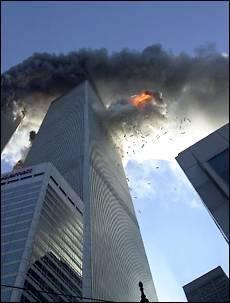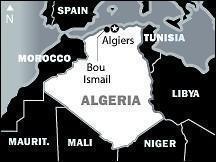 |
 |
|
|||||||
Nine-Eleven
Across the table from Humphries this morning was Enrique Ghimenti, a legal attaché in the FBI's Paris office. While Humphries had been tracking terrorists for four years, Ghimenti, former chief of an FBI counterterrorism unit, had been doing it for more than two decades. Ghimenti knew that the job was sometimes satisfying, and sometimes — as with one of his most recent cases — quite frustrating. This case involved a suspect in custody in Minnesota: Zacarias Moussaoui, a French national of Moroccan descent. Moussaoui was a student pilot who had frightened flight-school trainers in Minneapolis by insisting on learning to steer a jumbo jet while showing no interest in learning to take off or land. FBI agents in Minneapolis had questioned Moussaoui on Aug. 15 and asked to read files on his laptop computer. He refused to let them. The agents needed probable cause to persuade a judge to issue a search warrant to seize the laptop. They contacted Ghimenti in Paris, asking him to find out what the French intelligence service might have on Moussaoui. From the French, Ghimenti obtained a substantial dossier: The French had been tracking Moussaoui since 1995. He had links to al-Qaida. He had journeyed to Afghanistan several times and had trained at a terrorism camp.
Ghimenti passed the information along to Coleen Rowley, chief division counsel in the Minneapolis FBI office, and it went to the counterterrorism section at headquarters.
Moussaoui could be a common last name in France, the Minneapolis agents were told. How can we be certain it's the same man? Ghimenti's FBI office in Paris checked the phone book. There was only one Zacarias Moussaoui. Still, no warrant. Ghimenti was disappointed. But, with FBI responsibilities in 28 countries, he had plenty else to do. At breakfast that morning in a hotel, Ghimenti didn't talk about the Moussaoui case with Humphries. Instead, the two men and a third agent discussed Abdelmajid Dahoumane, an Algerian who had worked with Ressam in the failed plot to place a bomb at the Los Angeles airport. Dahoumane had been hiding in Algeria under false papers until Algerian police arrested him. After breakfast, the agents rode in an armored car to a government office where they met with Dahoumane. The Algerian was in no mood to talk; he denied any part in Ressam's plot. He claimed to have simply purchased an airline ticket for an immigrant friend. The agents returned to the hotel empty-handed. They were met there by Algeria's attorney general and other high-level officials. The Americans thanked the Algerians for allowing them to interrogate Dahoumane. The Algerians seized the opportunity to lecture, saying their nation needed more help in the fight against Islamic extremists. Algeria remained mired in the cycle of violence that had spurred young Ahmed Ressam to leave the country nearly a decade earlier. That cycle of terrorist attacks and military reprisals had claimed more than 150,000 lives. You in the United States can't understand what it's like to be terrorized by these people, the Algerian officials explained. The suffering here is unlike anything you Americans can imagine. As the Algerians were talking, Ghimenti's mobile phone rang. The message: Check the news on TV.
The FBI agents rushed to the hotel lounge and sat near a television showing Al-Jazeera, the Arabic news network.
Osama bin Laden, Humphries thought. Stunned, the agents rushed to the U.S. Embassy in Algiers to see what they could do to help. Ghimenti found himself thinking again about Zacarias Moussaoui and his bizarre flight training. The agents in Minneapolis were having the same thoughts. Ghimenti was called and asked again for help on the search warrant. Later that day, the FBI seized Moussaoui's laptop. On Sept. 12, Ghimenti and Humphries flew to Paris. Ghimenti told Humphries about the FBI's stalled inquiry into Moussaoui — the man who in December would be charged as an accomplice in the Sept. 11 attacks. Humphries was eager to question Ressam about what he might know about the attacks on New York and Washington. But it took the agent five days to make it home to Seattle. When Humphries was able to show Ressam a photograph of Moussaoui, Ressam said he recognized the French national as having been with him at the Khalden camp in 1998. Given the opportunity, might Ressam have identified Moussaoui earlier, spurring the FBI in Washington to pursue the Moussaoui search warrant? Might that warrant have yielded information that could have helped the bureau disrupt the Sept. 11 plot?
Humphries was haunted by the possibilities.
|
|
||||||||||||||||||||||||||||||||||||||||||||||||||||||||||||||||||||||||||||||||||||||||||||||
|
The Terrorist Within | Reprints seattletimes.com home |


